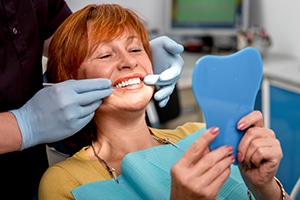Missing one or more teeth makes it difficult to chew and speak. You may also stifle your urge to smile and laugh if you are embarrassed about missing teeth.
Dentures and several other options are available to you if you would like to replace those missing teeth, and experienced Boulder dentist Dr. Michael Adler is personally committed to making sure you know all of your options and that you feel empowered to choose what's best for you. To schedule a free consultation at our cosmetic dentistry practice, please call our team at 303-449-1119.
Types of Dentures for Missing Teeth
There are 4 basic types of dentures:
- Full Dentures
- Partial Dentures
- Implant-Supported Dentures
- Neuromuscular Dentures
Many factors influence which of the types may be options for you. One of the most important factors is how many teeth are missing. Other things that commonly influence the decision of our guests are affordability, expectations of how the results will look and how the dentures will function.
Full dentures are made to replace a full arch of teeth, while a partial denture is used in combination with natural teeth to replace less than a full arch of missing teeth. Implant-supported dentures attach to dental implants placed in the bone beneath your gums. These dentures provide great durability and stability. As an experienced neuromuscular dentist, Dr. Adler provides neuromuscular dentures that are fitted very specifically to your teeth and jaws, so they hold the jaw in its most relaxed and functional position.
What Makes Our Dentures Different
Dr. Adler is an extensively trained and experienced neuromuscular dentist. Using neuromuscular principles, he makes sure your dentures not only replace your missing teeth, but also place your jaw and jaw muscles in a relaxed position and preserve the shape of your face. The neuromuscular technology used in your dentures treatment plan is -

- TENS electrical massage: The ultra-low frequency therapy of TENS relaxes the muscles of your jaws and neck. TENS therapy is an important part of identifying the optimal position of the jaw where it is most relaxed, and TENS therapy also provides several hours of pain relief.
- K7 evaluation system: This technology measures, tracks and records jaw movement and function. Dr. Adler uses the K7 device to measure jaw and muscle movement, and to hear the popping and other sounds your jaw is making. All this data is used by Dr. Adler to determine the most relaxed, optimal position of your jaw.
Incorporating this advanced technology enables Dr. Adler to determine your most optimal and comfortable bite position. The dentures are fabricated to maintain this bite position. Dr. Adler's advanced dentures customization will not only improve your teeth function and abilities to chew and speak, but also provide a rejuvenated facial shape because of the way your dentures maintain the fullness of your lower face.
Can I sleep in my dentures?
You shouldn’t sleep overnight in your dentures. Naps? Fine. Overnight. Not. You should remove your dentures at night, as this gives your gums and jawbone time to relax from the pressure of the denture during the day. Also, this is the time to clean your dentures and store them in water. If you fall asleep all night with them in, that is fine occasionally, but the next morning they should be removed and properly cleaned, along with your gums and overall mouth.
What should I not do after getting dentures?
Once we’ve gone through the process of fitting and adjusting your new dentures there isn’t anything you need to avoid. As mentioned above, you cannot sleep in your dentures, as your gums and jawbone need the overnight hours to relax and be free of the stresses of the dentures. This is particularly true of your gum tissue.
As for things to avoid, that will come down to food choices. As we will have discussed with you, there will be a transition to returning to eating solid foods. You’ll have to start by cutting any solid foods into small pieces that don’t require excessive chewing. You’ll want to start incorporating foods such as cooked rice and pasta, soft breads, soups, cooked vegetables (cooked past any crunchiness, for now), fish, and the like.
Once you make the adjustment to eating and the adjustment to wearing your dentures, there are foods you will need to completely avoid or eat sparingly. These foods fit into these categories:
- Sticky foods — Sticky foods can move your dentures out of place, allowing food to get underneath the dentures and irritate your gums. Examples: peanut butter, taffy, gummy candies.
- Foods with small but stubborn pieces —— Any food with pieces your natural teeth cannot grind or chew easily present problems for dentures. These can get stuck in and around your dentures. Examples: popcorn kernels, sesame seeds on rolls, shelled nuts or seeds.
- Hard foods — Hard foods require your jaw and your dentures to apply uneven pressure. This can damage or dislodge your dentures. Examples: nuts, popcorn, apples, carrot sticks, corn on the cob.
- Tough meats — Foods that require many bites to tenderize them place unnecessary stress on dentures and gums. Too much chewing and grinding creates sore spots where dentures and gums meet. Examples: pork chops, steak, ribs.
How long will it take for me to adjust to my dentures?
You will have an adjustment period getting used to your new dentures, and your dentures will need to get used to your gums. This period can vary, but you should plan to be patient with the process for about 30 days. This applies to full dentures, not partials or implant-supported dentures.

The reason you cannot simply pop in new dentures and go is that your gums and other soft tissues must get used to being in contact with the base of your artificial teeth. There will be some discomfort as your gums adapt to your dentures. Aggressive chewing is sure to chafe and cause further pain and irritation.
There will also likely need to be some fit adjustments made by Dr. Adler.
If you’ve been without teeth or missing many teeth for a long time, you’ll have to adjust to speaking again.
What happens if I were to leave my dentures in all the time?
- Speeds up bone loss — Wearing dentures places lots of pressure on your gums and the bone underneath. Not giving these oral structures a break can cause your jawbone resorption (the process of the bone breaking down and receding) to accelerate.
- Affects the fit — As your bone loss and gum loss accelerate, your dentures will become looser far faster than they should. This increases slippage and problems with eating.
- Welcome, bacteria — Wearing your dentures overnight is simply asking for hideous morning breath. The space where denture meets gums is the perfect location for bacteria to grow and thrive. These bacteria will result in bad breath and eventually will lead to gum disease.
- Gum inflammation — Sleeping in dentures adversely affects saliva flow, blocking the saliva’s path. This leads to a condition called denture stomatitis, also known as thrush. In thrush, the area beneath your dentures gets red and swollen, and this can lead to yeast-infected, inflamed gums.
What are dentures usually made from?
Fortunately, we’re no longer using wood and animal teeth to make dentures! Modern dentures are made from a variety of dental materials including acrylic, nylon, porcelain, resin, or metal. The denture framework is generally made from acrylic, nylon, or metal. The specific materials used to fabricate your denture framework will depend on the type of denture you’re having made.
Along with the denture framework comes the false teeth themselves. False teeth for dentures can be made from resin or porcelain.
Who is a candidate for dentures?
Some people wonder just what dentures would do for them beyond being able to chew harder foods. Well-fit dentures with Dr. Adler go beyond those benefits. They…
- Improve the ability to chew and bite properly.
- Allow the patient to again eat healthy hard foods such as nuts and fruit.
- Improve the wearer’s self-confidence and self-image.
- End the slurred consonant sounds created by missing teeth.
- Improve the wearer’s facial structure.
- Keep remaining teeth from moving (partial dentures).
Schedule Your Dentures Consultation Today
If you want to restore the appearance, strength and function of your smile with our dentures services in Boulder, Colorado, please call Adler Advanced Dentistry at 303-449-1119 or contact us online today to schedule a free consultation.

